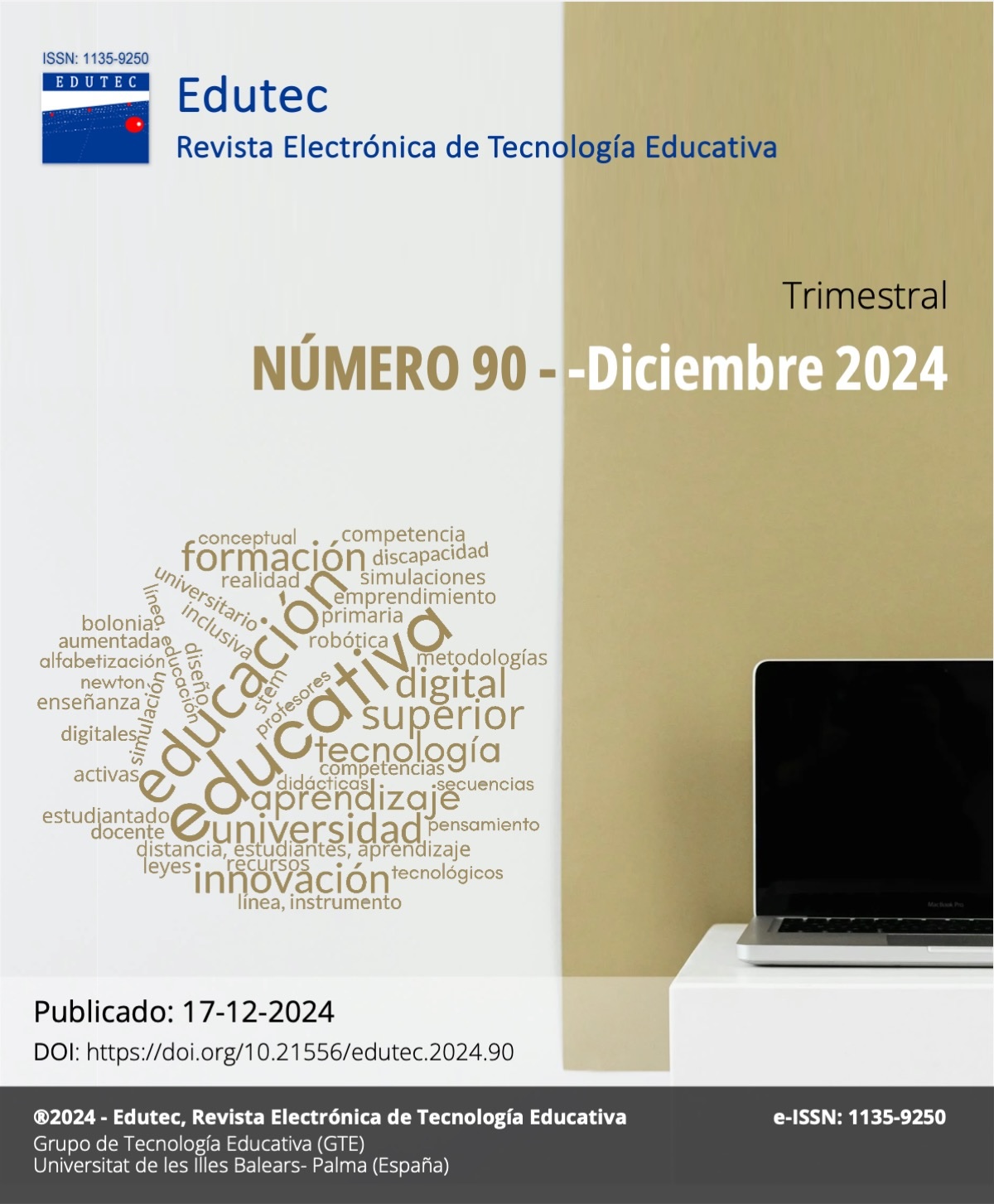Español
DOI:
https://doi.org/10.21556/edutec.2024.90.3393Keywords:
Active Methodologies, Educational Technology, Project-Based Learning, Design Thinking, STEM EducationAbstract
In an era of rapid technological and scientific advancement, training educators in STEM (Science, Technology, Engineering, and Mathematics) education equips them to prepare students for future job markets. This article presents the initial phase of the study "Learning Environments for Disciplinary Integration with STEM and Digital Technologies," which involved designing and implementing a training methodology to integrate STEM education into educational institutions, guided by the principles of design-based research. The developed method is founded on Design Thinking, active learning methodologies, and integrating educational technologies to address complex problems. Data suggest that the implemented method increased student motivation; educators reported feeling supported and equipped with effective pedagogical and technological tools. However, challenges in teacher training must be considered, calling for various strategies to ensure continuous professional development, specific mechanisms for curricular integration, and strategies to foster collaborative work among educators. The methodology proved replicability, indicating its potential to be adapted, transferred to different educational contexts, and implemented on a larger scale.
Funding
Aulas Amigas
Downloads
References
Acosta, C. (2023). Carreras universitarias relacionadas con las TIC son una demanda creciente en el país. La República. https://www.larepublica.co/.
Arifin, N. R., & Mahmud, S. N. D. (2021). A systematic literature review of design thinking application in STEM integration. Creative Education, 12(7), 1558-1571. DOI: https://doi.org/10.4236/ce.2021.127118
Benites, E. A., & Barzallo, S. A. (2019). STEAM como enfoque interdisciplinario e inclusivo para desarrollar las potencialidades y competencias actuales. Identidad Bolivariana, 1-12. DOI: https://doi.org/10.37611/IB0ol01-12
Cabrera, Agustina & Cabobianco, Marcos & Leon, Cristo. (2023). Desafíos y Oportunidades en la Alfabetización STEM: Una Mirada desde la Perspectiva de los Jóvenes en América Latina [Artículo en conferencia]. 226-232. https://doi.org/10.54808/CISCI2023.01.226. DOI: https://doi.org/10.54808/CISCI2023.01.226
Cardetti, Fabiana & Orgnero, M. 2013). Improving Teaching Practice Through Interdisciplinary Dialog. Studying Teacher Education: a journal of self-study of teacher education practices. https://doi.org/10.1080/17425964.2013.831756. DOI: https://doi.org/10.1080/17425964.2013.831756
Castañeda, L., Salinas, J. y Adell, J. (2020). Hacia una visión contemporánea de la Tecnología Educativa. Digital Education Review, 37, 240-268. https://doi.org/10.1344/der.2020.37.240-268. DOI: https://doi.org/10.1344/der.2020.37.240-268
Castro Rodríguez, E., & Montoro Medina, A. B. (2021). Educación STEM y formación del profesorado de Primaria en España. Revista de educación.
de Benito Crosetti, B., & Salinas Ibáñez, J. M. (2016). La Investigación Basada en Diseño en Tecnología Educativa. RiiTE Revista Interuniversitaria de Investigación en Tecnología Educativa. https://doi.org/10.6018/riite2016/260631. DOI: https://doi.org/10.6018/riite2016/260631
De Sola, V. (2011). Propuesta de un plan de evaluación dentro de los parámetros de evaluación multidireccional y por competencias, para evaluar materias de laboratorio en carreras universitarias (Doctoral dissertation, Universidad Monteávila).
Díaz, A. (2023, Septiembre). Necesitamos a más jóvenes en STEM. Forbes Centroamérica. https://forbescentroamerica.com/.
Domènech-Casal, J. (2018). Aprendizaje Basado en Proyectos en el marco STEM: componentes didácticas para la Competencia Científica. Ápice. Revista de Educación Científica, 21(2), 29-42. DOI: https://doi.org/10.17979/arec.2018.2.2.4524
Duarte D., Jakeline. (2003). Ambientes de Aprendizaje: Una Aproximación Conceptual. Estudios pedagógicos (Valdivia), (29), 97-113. https://dx.doi.org/10.4067/S0718-07052003000100007. DOI: https://doi.org/10.4067/S0718-07052003000100007
Fan, S. C., Yu, K. C., & Lin, K. Y. (2020). A framework for implementing an engineering-focused STEM curriculum. International Journal of Science and Mathematics Education. https://doi.org/10.1007/s10763-020-10129-y. DOI: https://doi.org/10.1007/s10763-020-10129-y
Fuertes Camacho, M. T., & Fernández Morilla, M. (2023). STEM education in childhood: perceptions of teachers. TECHNO Review: International Technology, Science and Society. DOI: https://doi.org/10.37819/revtechno.1882
Hernández, J. G., & Neira, R. H. (2022). Brecha en la vocación de los estudiantes por profesiones STEM y el mercado laboral europeo. IE Comunicaciones: Revista Iberoamericana de Informática Educativa, (35), 22-32.
Lopera, J. M. (2022). Inspiración e innovación: caso Aulas AMiGAS y TOMi.digital. https://www.eafit.edu.co/escuelas/administracion/emprendimiento-academico/bitacora-de-innovacion/casos-catedra-de-innovacion/Documents/Aulas_Amigas_catedra.pdf.
Macancela-Coronel, G. F., García-Herrera, D. G.,Erazo-Álvarez, C. A. y Erazo-Álvarez, J. C.(2020). Comprensión del aprendizaje interdisciplinar desde la educación STEM. EPISTEME KOINONIA,3(1), 117 39. https://fundacionkoinonia.com.ve/ojs/index.php/epistemekoinonia/article/download/995/1784. DOI: https://doi.org/10.35381/e.k.v3i1.995
Martínez, R. C. J., Zúñiga, C. P. C., Velázquez, M. R., & Llerena, E. M. V. (2023). Fortaleciendo la empleabilidad: Upskilling y Reskilling como clave para un futuro laboral en perpetua transformación. Dilemas contemporáneos: Educación, Política y Valores.
Masaquiza, R. R. C., Arce, K. L. R., Pozo, D. I. L., & Gualoto, O. I. P. (2024). Desarrollo de habilidades del siglo XXI a través de la educación STEM. Revista Imaginario Social, 7(2). DOI: https://doi.org/10.59155/is.v7i2.191
Ramos-Lizcano, C., Ángel-Uribe, I. C., López-Molina, G., & Cano-Ruiz, Y. M. (2022). Elementos centrales de experiencias educativas con enfoque STEM. Revista Científica, 45(3), 345-357. https://doi.org/10.14483/23448350.192981. DOI: https://doi.org/10.14483/23448350.19298
Sánchez, M.M. (2023). Los desafíos de la Tecnología Educativa. RiiTE Revista Interuniversitaria de Investigación en Tecnología Educativa, 14, 1-5. https://doi.org/10.6018/riite.572131. DOI: https://doi.org/10.6018/riite.572131
Sarican, G., & Akgunduz, D. (2018). The Impact of Integrated STEM Education on Academic Achievement, Reflective Thinking Skills towards Problem Solving and Permanence in Learning in Science Education. Cypriot Journal of Educational Sciences, 13(1), 94-107. DOI: https://doi.org/10.18844/cjes.v13i1.3352
Struyf, A., De Loof, H., Boeve-de Pauw, J., & Van Petegem, P. (2019). Students' engagement in different STEM learning environments: Integrated STEM education as promising practice?. International Journal of Science Education, 41(10), 1387-1407. DOI: https://doi.org/10.1080/09500693.2019.1607983
Sampieri, R. H. (2006). Ampliación y fundamentación de los métodos mixtos. Recuperado de: https://www.sandrameza.net/metodologiapdf/12.pdf.
Wu-Rorrer, R. (2017). Filling the gap: Integrating STEM into career and technical education middle school programs: There is no single strategy for approaching STEM integration. Technology and Engineering Teacher, 77 (2), 8.
Downloads
Published
How to Cite
Issue
Section
License
Copyright (c) 2024 Edutec. Revista Electrónica de Tecnología Educativa

This work is licensed under a Creative Commons Attribution 4.0 International License.
By submitting the paper, the authors assign the publication rights to the journal Edutec. For its part, Edutec authorises its distribution as long as its content is not altered and its origin is indicated. At the end of each article published in Edutec, the citation procedure is indicated.
The management and editorial board of Edutec Revista Electrónica de Tecnología Educativa do not accept any responsibility for the statements and ideas expressed by the authors in their work.
Translated with www.DeepL.com/Translator (free version)









